Austria's Ambassador to Ukraine: "Small and medium-sized Austrian enterprises suffered severe damage in the Ukrainian territories occupied by russia"
Arad Benkö speaks of the state of Austrian business in Ukraine, corruption risks and participating in the reconstruction of destroyed regions

Austria and Ukraine are deeply tied by historical milestones. The belonging of a part of Western Ukraine to the Habsburgs’ Austro-Hungarian Empire (before the First World War) still leaves its mark. In particular, a significant portion of Austrian businesses is located in the western part of our country – in Zakarpattia. At the onset of russia's full-scale invasion of Ukraine, many Austrian companies relocated their operations to Western Ukraine.
As for direct investments, Austria was among the countries whose Foreign Direct Investment (FDI) in Ukraine's equity capital amounted to almost $2 billion prior to the full-scale russian invasion. The Austrian Republic held the fourth position in the list of our largest foreign investors. Among the most significant pre-war directions of Austrian capital investment was banking represented by such giants as Raiffeisen Bank International AG, UniCredit Bank Austria AG, and Erste Bank.
Mind talked to Arad Benkö, the Ambassador of Austria to Ukraine, regarding the current state of Austrian investment in the Ukrainian economy, business losses from the war, and the comfort of the Ukrainian business environment in wartime.
On the impact of the war on Austrian investments in Ukraine
On the impact of the war on Austrian investments in Ukraine
– A decade ago, Wolf Dietrich Heim, the Austrian Ambassador to Ukraine, assured in an interview that "the Austrian economy has firmly established itself in Ukraine, and current political issues have little impact on it." Would you agree with such a statement today? Can it be said that russia's armed aggression against Ukraine has not affected bilateral business relations?
– Despite the war, the Austrian economy is still strongly represented in Ukraine. However, after February 24, 2022, some of our companies' operation was significantly reduced, and some were 'frozen'. Nevertheless, thanks to the experience gained during the coronavirus pandemic, many companies could relocate their employees to safe places in Ukraine or temporarily abroad, thus maintaining their work.
In some industries, this is, of course, easier. In the banking or insurance sectors, for example, online work can be arranged from secure locations.
Moreover, many Austrian companies have been providing accommodation for their employees abroad at their own expense for many months.

When comparing the statistical data for 2021 and 2022, the exports to Ukraine only dropped by 2.9%, and the imports from Ukraine to Austria decreased by 5%. Considering that 7–8 million Ukrainian consumers are currently abroad, that's a good indicator.
Precise cumulative data regarding Austrian investments in Ukraine for 2022 and 2023 is unknown. It's a fact, however, that Ukraine is a significant market for Austrian companies: approximately 1.62 billion euros were invested in the country by early 2023. 95% of the enterprises that were operating in Ukraine before the full-scale invasion by russia continue their work and even expand. About half of them operate at 100% capacity compared to the period before February 24, 2022. Other Austrian businesses operate at capacities ranging from 40% to 70% of their pre-war production volumes.
Unfortunately, I'm not familiar with the pre-war Ukrainian economy in detail, as I arrived as the Austrian ambassador to Ukraine only in May 2022. Naturally, there are close ties between politics and business, and during the war, for understandable reasons, they become even more intertwined. War undoubtedly has a massive impact on the economy and the country's population. Certainly, this also affects the activities of the Austrian economy here. However, it wouldn't be accurate to say that these consequences are dramatic. On the other hand, it's evident that the war significantly complicates or makes new investments impossible. Eventually, there are many Austrian companies already operating here that would like to expand their investments, but they cannot do so for various reasons (which to be detailed later). There are also numerous potential new investors who would like to enter the Ukrainian market – however, it's challenging for them due to investment guarantee issues.
Above all, I am proud that each Austrian company has made and continues to make humanitarian or financial contributions to support Ukraine within their means.
On Austrian 'investment powerhouses'
– Name the three largest companies still operating in Ukraine and three industries that are interesting to Austrian business despite the war.
– As of now, there are almost 200 branches of Austrian companies in Ukraine. 25 of them are manufacturing ones, providing jobs for 20,000 Ukrainians.
It is hard for me to pick out the largest companies because not all financial indicators are public.
However, there are some 'champion investors' producing products crucial to society. On one hand, there's Kronospan, one of the largest producers of wood-based materials, which has invested nearly 1 billion euros in its factories in Rivne and Lutsk over the last 15 years. Or a pulp mill in Ukrainka, Kyiv Oblast, producing packaging materials and cardboard, employing nearly 2,500 workers.

The Kyiv Cardboard and Paper Mill is one of Europe's largest producers of cardboard and paper products. It represents one of the most significant Austrian investments in Ukraine, totalling almost 300 million euros over the last 20 years. If you happen to read Vogue magazines, know that they are printed on paper from this mill. Even the legendary 'scary' Soviet-era toilet paper from is also manufactured there.
Approximately 20 Austrian companies are engaged in the agricultural technology sector in Ukraine, offering innovative solutions for local farmers. Another substantial investment comes from Agrana Fruit, specialising in the production of concentrates for fruit juices and fruit fillings. The company's fruit processing plant in Vinnytsia focuses on processing fruits and berries. Well-known brands of ice cream and yoghurts with fruit concentrates from Agrana in Vinnytsia can be found in many popular restaurants. Since 1997, the company has invested almost 40 million euros in the plant's capacity and industrial space for fruit cultivation.
In the agricultural sector of Ukraine, there is also the presence of Pfanner, a firm located in Dnipro and one of the world leaders in the production of juices and juice-based beverages. In Austria, both of these enterprises are highly recognised and popular in the fruit juice manufacturing industry.
Austrian companies also show great interest in Ukraine's energy sector, particularly in renewable energy sources, 'green', and ecological technologies.
On the geographical spread of Austrian businesspeople's activities
– And in which sectors of our economy is Austrian business active?
– Austrian companies in Ukraine operate in various industries. For instance, there is a robust production of ironing boards and sports boards by the Austrian company Eurogold Industries Ltd in the Zhytomyr Oblast. And also – the production of skis in Zakarpattia by Fischer Ski and Blizzard. Fischer Sports invested in the most modern ski production facility in Europe in Mukachevo and completed the project during the war. After a major fire in October 2020, 80 million euros were invested in the largest ski factory in Europe to restart production. And now, Fischer Ski produces over a million skis and snowboards, covering half of the global market demand for these products. Another Austrian company, Head International Holding GmbH, has acquired 80 hectares of land in Vinnytsia and plans to establish ski production there as well.
Andritz has been operating in Ukraine for many years, supplying crucial components such as turbines for the modernisation of the Dnipro Hydro Power Plants. In our view, the Ukrainian hydropower market has a promising future. Austrian Airlines employs over 300 people who work in the call centre in Lviv. Marzek produces labels and packaging in large batches in Dnipro.
There are also Austrian companies working in Ukraine in the financial sector, notably Raiffeisen Bank. In the insurance sector, this includes Uniqa Group Austria (under the brand Credo Classic IC), and leaders in the insurance market of Central and Eastern Europe such as Vienna Insurance Group, and Grawe. Real estate has also long been of interest to Austrian investors.
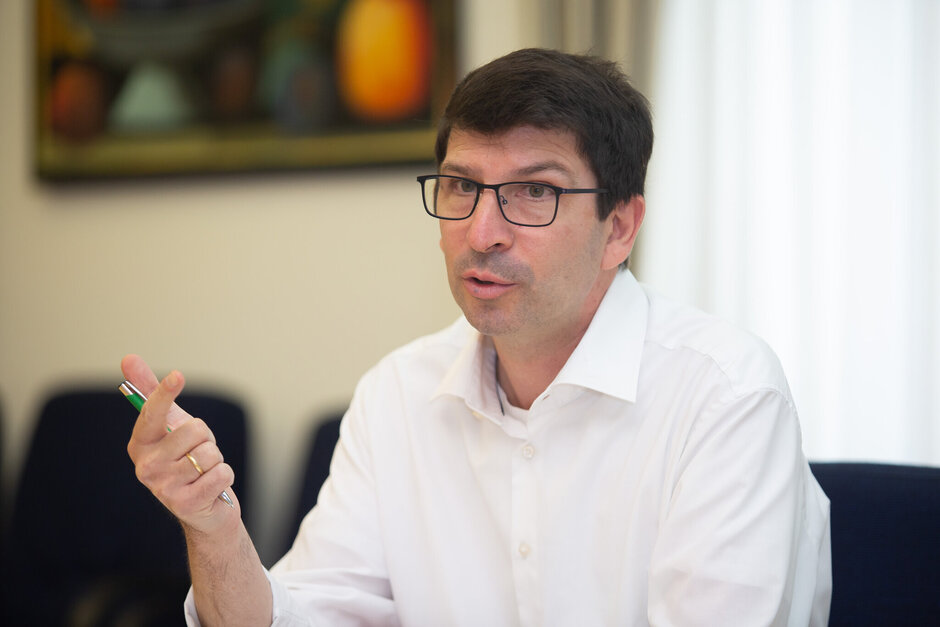
Another major enterprise is located in Lutsk and Zhytomyr. Specifically, the company Kromberg & Schubert has been present there for 15 years, manufacturing cable and wiring products and employing over 8,000 Ukrainian workers.
– It seems that the war didn't frighten Austrian business community much…
– The war was a shock for both companies and all of us, but after the first weeks, an assessment of the situation was done – and the work resumed. Austrian companies make a significant contribution to the functioning of the Ukrainian economy and take pride in their presence in Ukraine.
Thanks to historically formed relations and a high level of satisfaction with them, our companies make long-term plans and invest in a common future. They are also distinguished by a high level of loyalty and responsibility towards their employees.
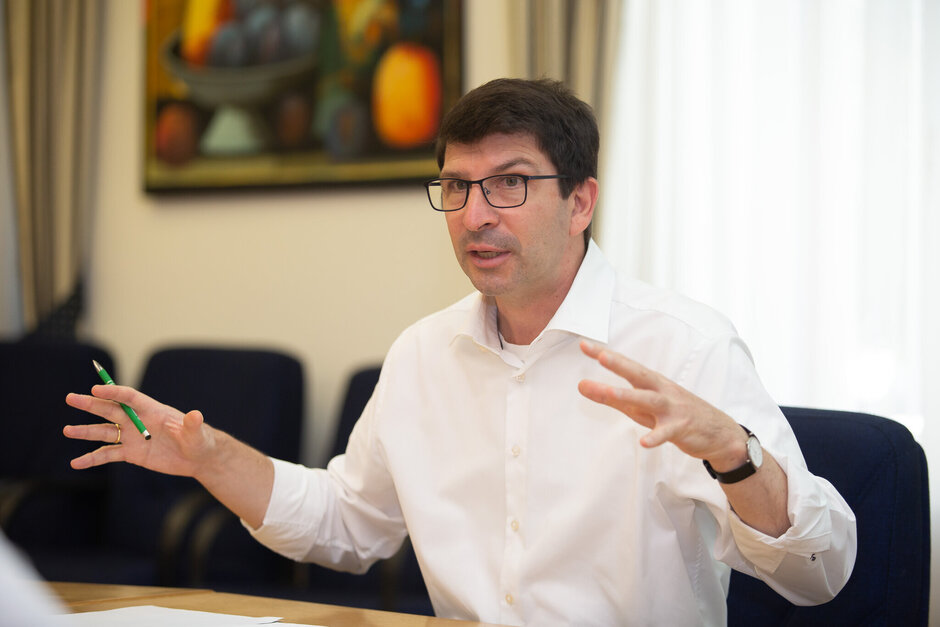
I try to visit one of the Austrian companies in Ukraine every month to get an overall picture of their operations here, especially during the state of war. Just recently, I was at the Kronospan plant in Rivne, and I was informed that a new logistics centre had been built near Kyiv.
In December of last year, I visited the production facilities of Fischer Ski in Mukachevo, where at the time, more than 1000 employees were working. I'm not an expert in economics, but it's the most modern factory of all that I've seen.
– Just a few years ago, Austrian entrepreneurs identified the agricultural sector as one of the promising Ukrainian industries. How is investment activity developing there now?
– Our companies are actively involved in the agricultural sector of Ukraine, including Agrana Fruit and Pfanner, which I mentioned earlier. However, the agricultural sector has suffered from the loss of sales and export markets due to the war, such as to Kazakhstan or Belarus, and the number of consumers in Ukraine has dropped as many people have left the country.
I'll mention another Austrian company – Agro Plus 2006, owned by Thomas Brunner, who breeds pigs in the Cherkasy Oblast. The company is medium-sized but successful. For instance, it supplies its meat products (prosciutto) to the supermarket chain GoodWine in the capital.
I didn't highlight the Austrian experience in pig farming in Ukraine for nothing, as this process is based on the use of biotechnology.
And we see a great interest from Ukrainian agro-enterprises in the application of biodiesel, biomass, and bioethanol in agriculture.

And we see a great interest from Ukrainian agro-enterprises in the application of biodiesel, biomass, and bioethanol in agriculture.
We receive inquiries from many Ukrainian agricultural enterprises (small and medium-sized) about acquiring Austrian know-hows. The war has even intensified this interest from the Ukrainian side because your producers are now focusing on the quality of their products. Considering that Ukraine aims to join the EU, it's worth noting that in the production of agricultural products, Ukraine will compete with countries like Poland and France. A crucial factor that could help is the quality of the product.
On the losses of Austrian business due to the war
– You mentioned that some Austrian companies relocated to Western Ukraine with the onset of russian aggression. Are there examples of Austrian businesses that ended up in territories controlled by russia and couldn't evacuate (such as Dunapack, a corrugated cardboard packaging plant in the Kherson Oblast)? What is happening to them? What are the losses in investments, and are you exploring possibilities for reparations?
– Overall, small and medium-sized Austrian businesses have suffered severe damage in the russian-occupied Ukrainian territories. I'm in constant contact with Austrian companies represented in Ukraine. The companies that incurred losses have documented their lost investments, but we don't have detailed information.
Another example of lost investments is nearly 30 petrol stations of the company Amic Energy, which also ended up in the occupied territories. The managing director of the company informed me that they have no information about the fate of these petrol stations. While he contacts former employees, they no longer work there, and the owners of Amic don't know what is currently happening with their property. Amic expects 8 million euros in lost investments.
Unfortunately, some entirely new investments were either completely destroyed or severely affected during the hostilities.

When we talk about the investments of almost 200 Austrian companies in Ukraine, it’s primarily about small and medium-sized enterprises (according to European standards) with approximately EUR 3-5 million annual turnover.
On the Ukrainian business climate from the Austrian perspective
– At the beginning of our conversation, you mentioned that many Austrian businessmen are interested in entering the Ukrainian market. But there are a few 'buts'... Your predecessors, Wolf Dieter Heim and Hermine Poppeller, talked about the inefficient operating of government agencies, issues with VAT refunds, delays in court proceedings, and corruption. In essence, Austrian investors didn't feel their businesses were adequately protected here. What risk factors in our business climate are Austrian businessmen complaining about today (besides war), and what should be done to attract more successful investments?
– First and foremost, I want to emphasise that Austrian companies are happy to invest in Ukraine and are generally satisfied with the current state of affairs. However, there are concerns about the predictability and transparency of doing business in Ukraine as well. Legal issues (such as tax matters) and corruption, of course, play a role, and unfortunately, the situation hasn't improved since the start of hostilities in Ukraine.
A few weeks ago a business forum was held in Lviv, attended by 50–60 representatives from Austrian business circles. They discussed issues related to investments in Ukraine. During this forum, three factors of great importance were highlighted.
One aspect is financing and guarantees for loans. Since Ukraine is in a state of war, the Austrian Control Bank (Oesterreichische Kontrollbank) cannot provide any guarantees for Austrian investments here. However, we have somewhat addressed this issue: in June, the Austrian Control Bank reopened options for coverage to secure export operations to Ukraine and investments in a limited amount of up to 5 million euros. This is an important and positive step.
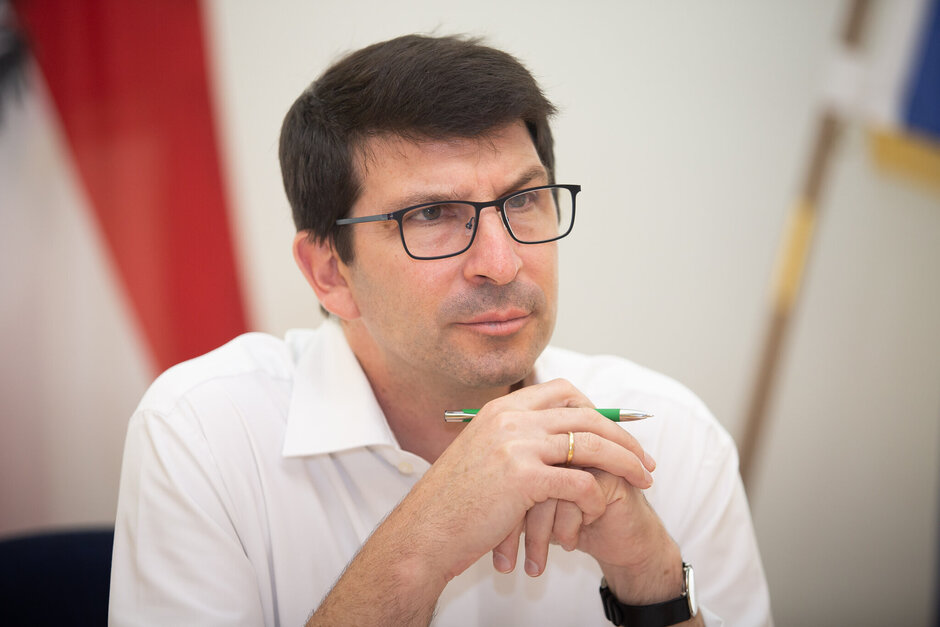
Communication with their headquarters in Austria is another issue that Austrian entrepreneurs pay attention to after a year and a half of war. Ultimately, communication via Zoom in the long term is insufficient. And for representation office managers in Ukraine, it's quite challenging to travel abroad for negotiations or consultations in Austria (previously, Ukrainian executives visited their central offices in Austria every two to three months).
The third problem is the insufficient amount of labour in Ukraine. Many Ukrainian men who used to work in Austrian companies in Ukraine have now been called to the front lines.
– And such ‘trifles' as bribes, corrupt courts, the arbitrariness of the tax and customs authorities, etc. don’t bother Austrians too much, do they?
– The most common complaints that Austrian companies address to the embassy concern bureaucracy and decision-making mechanisms (which are sometimes difficult to understand), corruption, close ties between business and politics, and the lack of legal clarity.
When entrepreneurs turn to the embassy for support, we, of course, try to help them to the best of our abilities. We can't look behind the scenes and be certain whether the company under investigation has violated the law or not. Usually, we approach the Ukrainian authorities and ask them to investigate the matter more thoroughly.
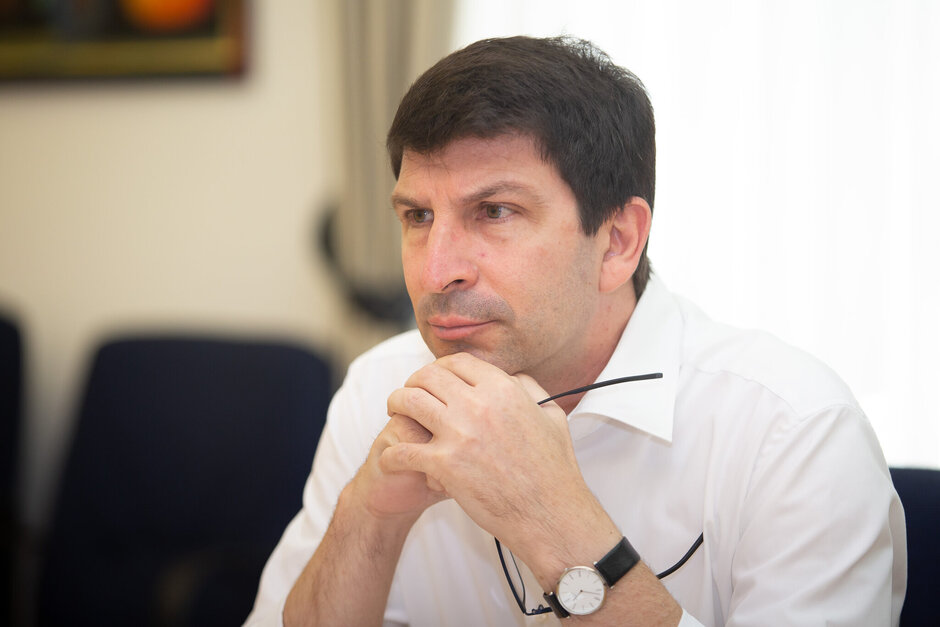
Upon the request of two Austrian companies facing cases of tax evasion and ties to russia, I even took part in their press conferences. Embassy representatives aren't company lobbyists, but we try to help them defend their rights to the fullest extent – ensuring there are no business disruptions where guilt is not proven. We also monitor the progress of investigations to ensure cases are handled in accordance with the law.
As a representative of an EU country embassy, I must note that the Ukrainian government is making significant efforts to combat corruption, and a lot has been made. For Ukraine, a candidate country for EU accession, implementing these painful reforms is crucial. It's clear that such reforms take time, but companies act as good seismographs to measure whether corruption is decreasing. Ukraine has a friend and partner by the name of Austria in its efforts to integrate into the EU; as friends, we also consider it our job to point out any shortcomings honestly and offer our services.
Every year, the Austrian Ministry of Foreign Affairs organises a conference for all Austrian ambassadors worldwide, and each year, one of its segments is dedicated to discussions with Austrian entrepreneurs. The line to the Ukrainian booth is always long, which impressively reflects the interest in your country. But the most common question I get is, "What is the state of corruption in Ukraine?" And it is a serious issue your state’s image. However, Austria is quite strongly represented in Ukraine and ranks fourth among foreign investors.
By the way, I travel a lot to Ukrainian regions, communicate with local businessmen, and get the impression that Ukrainian partners have a very good experience working with Austrian companies and partners. This is because we always negotiate with Ukrainian entrepreneurs on equal terms and usually try to flexibly respond to their wishes.
On the freezing of russian assets and Austria's contribution to Ukraine's recovery
– In Ukraine, the topic of rebuilding the state after the war is currently very relevant. It is known that russian private assets frozen in EU member states amounted to over 19 billion euros by the end of 2022. In Austria, in particular, these assets exceed 2 billion euros. What exactly are these assets (related to which sectors), and does Austria intend to transfer them for the recovery of Ukraine's economy?
– The embassy is often asked about our opinion about 'frozen' russian assets. In Austria, over 2 billion euros of such funds were frozen, in Germany – over 10-11 billion euros, and in the EU overall, it is approximately 21-22 billion euros. Currently, almost 200 billion euros of funds from the russian central bank are frozen in the EU.
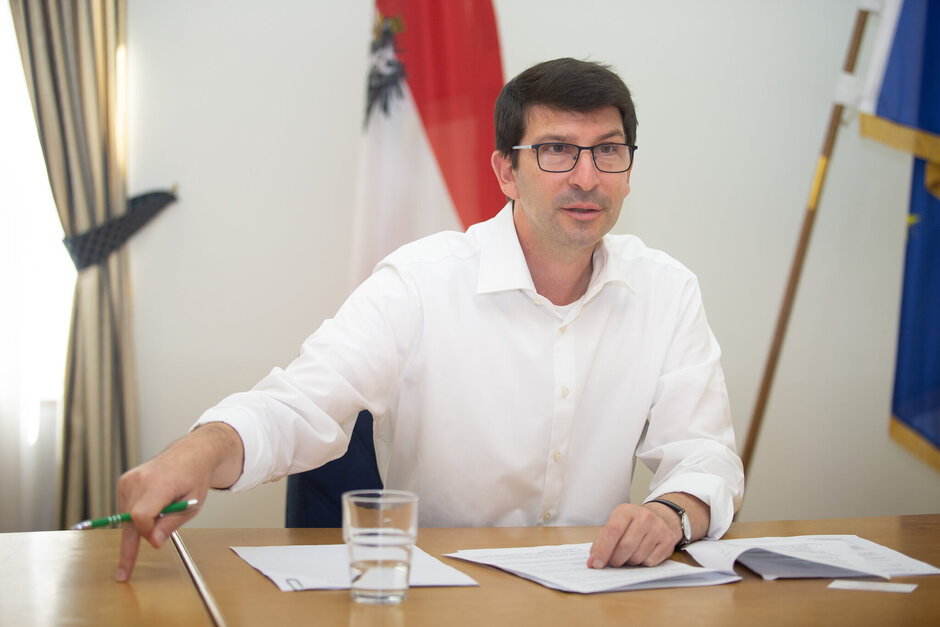
Now, regarding the use of these assets for reparations to Ukraine for russia's war crimes. The initial reaction, not only in Austria but throughout the European Union, was quite cautious – whether these funds could be used for the reconstruction of Ukraine, as it requires a corresponding legal analysis.The EU's position, however, has somewhat changed lately: a working group at the EU level has been formed to address this issue.
We consider russia as an aggressor and believe that it should contribute to the reconstruction of Ukraine. But the question arises of how to use these frozen funds to ensure everything happens within the legal framework. EU experts (at the Brussels level) work on this ambiguous issue with the assistance of experts from all EU members to find a solution. Moreover, Austria is among the countries that keep records of the damages inflicted by russia on Ukraine, and these records are continually being processed. In any case, we advocate for a solution within the framework of international law and in coordination with our partners.
– And what contribution is Austria ready to make to the reconstruction process in Ukraine, aside from the potential russian assets?
– As I've mentioned before, there are approximately 200 Austrian companies represented in Ukraine. There are also many entrepreneurs eager to invest their money here in the future. So, there is an interest in the reconstruction process of Ukraine, specifically in infrastructure.
Ukraine is currently a trendy country. Several reconstruction conferences have been held, with the latest major one taking place in London in June. There are ambitious plans and many promises being made. Bilateral protocols and agreements are signed each time, but they are not always fulfilled.

Ukraine is fighting on many fronts, and I admire the resilience of the government and the people on various fronts. But, of course, there is also great disappointment because support doesn't always come quickly and in the desired amount. And it's challenging to finance necessary investments in a country at war.
International financial institutions have resources amounting to billions of euros/dollars. Indeed, many foreign companies are knocking on the door and asking where they can get funds to operate. However, it's very difficult to do so because European bureaucracy is quite rigid. And entering the Ukrainian market for a new firm is extremely challenging. Nevertheless, Austrian companies have not turned away from Ukraine, and they will continue to support the Ukrainian economy and reconstruction efforts.
If you have read this article to the end, we hope that means it was useful for you.
We work to ensure that our journalistic and analytical work is of high quality, and we strive to perform it as competently as possible. This also requires financial independence. Support us for only UAH 196 per month.
Become a Mind subscriber for just USD 5 per month and support the development of independent business journalism!
You can unsubscribe at any time in your LIQPAY account or by sending us an email: [email protected]


